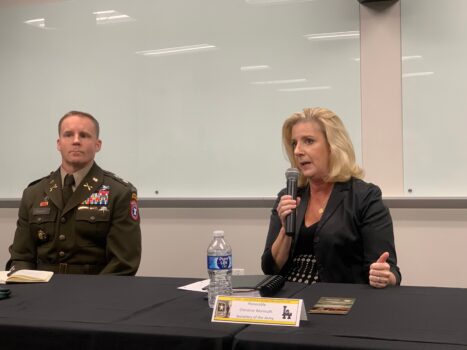US Army Secretary Expanding Recruitment to Meet Military Challenges From China and Russia
On Nov. 2, U.S. Secretary of the Army Christine Wormuth emphasized at a U.S. Army Los Angeles Community Partners meeting that the U.S. military is currently focused on expanding recruitment and strengthening its combative power to meet military challenges from China and Russia.The Epoch Times has permission to publish part of her speech. “For the last 20 years, we have been deeply engaged in counterinsurgency and counterterrorism. You know, we spent most of our time in Iraq, Afghanistan, and other places in the Middle East,” she said. “But now we are shifting much more to focus on nation state challenges.” Wormuth further identified China as “the pacing challenge” and Russia as an “acute threat.” The Chinese Communist Party’s (CCP) attempt to modernize its military is concerning, she said. “We have got to find a way to improve our recruiting results because it is very, very important that we’re able to fill that army of a sufficient size to do what it needs to do as part of the joint force to fight and win the nation’s wars,” she stressed. The Pentagon released the U.S. National Defense Strategy report (pdf) on Oct. 27, saying that the CCP is working to undermine U.S. alliances in the Indo-Pacific region and use its growing military to coerce and threaten neighbors. The report concludes that China has become the greatest security challenge for the United States despite the ongoing Russian war in Ukraine, and the threat from Beijing will determine how the U.S. military is equipped and shaped for the future. Army’s Huge Demand for STEM Talents Wormuth said the U.S. Army is currently implementing a modernization strategy, focusing on six modernization portfolios, including future vertical lift, next-generation armored vehicles, network, long-range precision fires, missile defense, and soldier lethality. “A lot of the new systems that we are developing are very high tech,” she said. “We now have a huge need for STEM skills in our army.” She hopes the public will change its stereotypes about the U.S. Army, which needs infantrymen, helicopter pilots, and tankers, as well as data scientists, programmers, cyber specialists, nurses, doctors, lawyers, and paralegals. The Army offers more than 178 career specialties. Young people who want to join the Army can pursue almost any of these fields and receive specialized training. “I think one of the things that we got to do is, helping Americans understand that the Army has huge opportunities for our young people,” she added. Secretary of the Army Christine E. Wormuth (R) and LTC Johann W. Hindert (L), commander, U.S. Army Recruiting Battalion Los Angeles, speaking at a U.S. Army Los Angeles Community Partners meeting in Los Angeles on Nov. 2, 2022. (Linda Jiang/The Epoch Times) Enhancing the Protection of Military Personnel Army recruiting hit a bottleneck during the COVID-19 pandemic after the Department of Defense implemented a vaccine mandate for all members of the military. Wormuth said the current situation is “probably the most profound recruiting challenge” she has seen since she “began working in the field of national security back in the mid-1990s.” She believes there are three main reasons: young people’s willingness to join the military is low and their physical fitness is not up to standard; the booming job market in the United States has weakened the Army’s competitive advantage; and public misconceptions about the military. She further explained that in the midst of the pandemic, the risk of anxiety disorders and depression among young people has increased dramatically. Because of these mental ailments, as well as childhood obesity, many young Americans fail to meet the criteria for military service. As for the public’s misconceptions about the military, Wormuth believes that much of the media coverage of the army, such as suicide and sexual harassment, has also had a subtle impact on the public. As a result, many parents worry that their children will be unsafe if they join the Army. “Fundamentally what I think we really need to do is reintroduce the Army to the American public,” she said. These issues reported by the media are not unique to the military; instead, the Army is continually developing programs to address them with remarkable results, she continued. “We have seen suicides in the Army declined by 20 percent Compared to last year.” The U.S. Army also invests more than $1 billion annually to strengthen the barracks environment. “After 9/11, we increased security dramatically at all of our installations,” Wormuth said. She hopes that the public can reshape their understanding of the U.S. Army. Follow Follow

On Nov. 2, U.S. Secretary of the Army Christine Wormuth emphasized at a U.S. Army Los Angeles Community Partners meeting that the U.S. military is currently focused on expanding recruitment and strengthening its combative power to meet military challenges from China and Russia.
The Epoch Times has permission to publish part of her speech.
“For the last 20 years, we have been deeply engaged in counterinsurgency and counterterrorism. You know, we spent most of our time in Iraq, Afghanistan, and other places in the Middle East,” she said. “But now we are shifting much more to focus on nation state challenges.”
Wormuth further identified China as “the pacing challenge” and Russia as an “acute threat.”
The Chinese Communist Party’s (CCP) attempt to modernize its military is concerning, she said.
“We have got to find a way to improve our recruiting results because it is very, very important that we’re able to fill that army of a sufficient size to do what it needs to do as part of the joint force to fight and win the nation’s wars,” she stressed.
The Pentagon released the U.S. National Defense Strategy report (pdf) on Oct. 27, saying that the CCP is working to undermine U.S. alliances in the Indo-Pacific region and use its growing military to coerce and threaten neighbors.
The report concludes that China has become the greatest security challenge for the United States despite the ongoing Russian war in Ukraine, and the threat from Beijing will determine how the U.S. military is equipped and shaped for the future.
Army’s Huge Demand for STEM Talents
Wormuth said the U.S. Army is currently implementing a modernization strategy, focusing on six modernization portfolios, including future vertical lift, next-generation armored vehicles, network, long-range precision fires, missile defense, and soldier lethality.
“A lot of the new systems that we are developing are very high tech,” she said. “We now have a huge need for STEM skills in our army.”
She hopes the public will change its stereotypes about the U.S. Army, which needs infantrymen, helicopter pilots, and tankers, as well as data scientists, programmers, cyber specialists, nurses, doctors, lawyers, and paralegals. The Army offers more than 178 career specialties. Young people who want to join the Army can pursue almost any of these fields and receive specialized training.
“I think one of the things that we got to do is, helping Americans understand that the Army has huge opportunities for our young people,” she added.

Enhancing the Protection of Military Personnel
Army recruiting hit a bottleneck during the COVID-19 pandemic after the Department of Defense implemented a vaccine mandate for all members of the military.
Wormuth said the current situation is “probably the most profound recruiting challenge” she has seen since she “began working in the field of national security back in the mid-1990s.”
She believes there are three main reasons: young people’s willingness to join the military is low and their physical fitness is not up to standard; the booming job market in the United States has weakened the Army’s competitive advantage; and public misconceptions about the military.
She further explained that in the midst of the pandemic, the risk of anxiety disorders and depression among young people has increased dramatically. Because of these mental ailments, as well as childhood obesity, many young Americans fail to meet the criteria for military service.
As for the public’s misconceptions about the military, Wormuth believes that much of the media coverage of the army, such as suicide and sexual harassment, has also had a subtle impact on the public. As a result, many parents worry that their children will be unsafe if they join the Army.
“Fundamentally what I think we really need to do is reintroduce the Army to the American public,” she said.
These issues reported by the media are not unique to the military; instead, the Army is continually developing programs to address them with remarkable results, she continued.
“We have seen suicides in the Army declined by 20 percent Compared to last year.”
The U.S. Army also invests more than $1 billion annually to strengthen the barracks environment.
“After 9/11, we increased security dramatically at all of our installations,” Wormuth said.
She hopes that the public can reshape their understanding of the U.S. Army.












